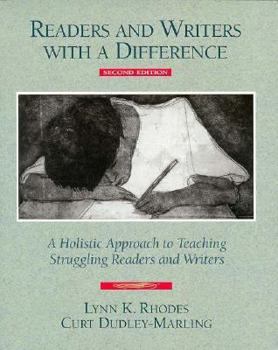Readers and Writers with a Difference: A Holistic Approach to Teaching Struggling Readers and Writers
Today, as more and more students with learning problems are entering mainstream classroom settings, the models presented by Rhodes and Dudley-Marling are more cogent than ever. But the framework upon which whole language theory rests has greatly evolved since the first edition was published and has also come under increasing attack. This second edition renews the case for whole language theory, taking into account the various developments in language arts over the past eight years. Included are new and expanded sections on literacy theory, instruction and assessment, and literacy as social practice; and a reconsideration of how teachers, administrators, and parents might work and learn collaboratively.
The authors write, "It is no longer possible to talk about approaches to teaching students to read (and write) once and for all," write the authors. "Instead, we have to think about supporting students as they learn a range of literate practices . . ." The second edition of Readers and Writers with a Difference offers myriad suggestions for making that range as rich and far reaching as possible.





